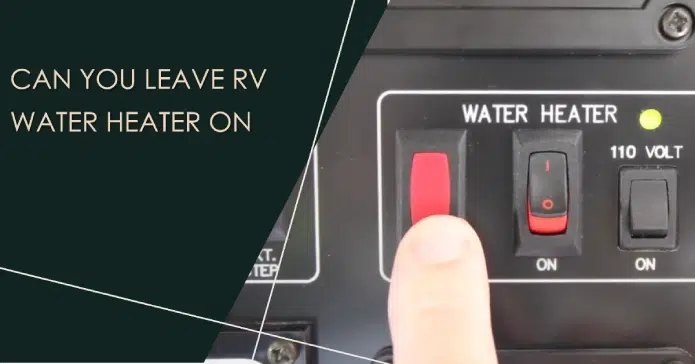Last Updated on June 20, 2023
Instant hot water in an RV is convenient and comfortable. A properly functioning water heater will greatly enhance your overall comfort on a road trip or camping.
Now the question arises, can you leave the RV water heater on?
Your RV water heater can remain on all the time. The environment is just like the one at home. When you’re not using warm water, it stays heated and ready for use when needed. Ensure your tank has enough water, and turn off the water heater before moving your RV.
Let’s discuss the pros and cons of leaving your RV water heater on, safety considerations, and other relevant details.
When Can You Leave the RV Water Heater On?
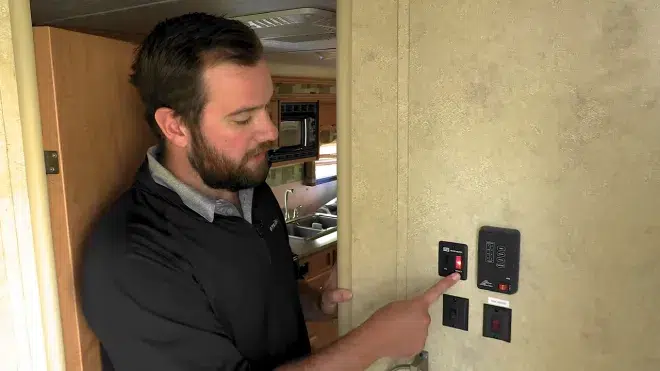
If you concern yourself with safety, then it is possible to leave your RV water heater on as long as you follow some basic guidelines. There are a few factors that you must take into account before leaving your RV water heater on:
No 01: Power Source
Make sure the water heater’s hooked up to a reliable power source, like functional electricity or a full propane tank, depending on the type of heater you have. This is important because if your power source is not functioning properly, it can lead to issues with your water heater.
For example, if there isn’t enough propane in your tank for a gas-powered water heater, it won’t be able to heat your water effectively.
No 02: Usage Patterns
To optimize the usage of your RV’s water heater, it’s essential to strategize on when and how frequently it should be turned on. Leaving the heater on is more convenient if you’re using hot water throughout the day. This way, steaming water will be readily available whenever you need it.
If your warm water demand is sporadic or your RV will be parked for an extended period, you should turn off the heater to conserve energy. Proper water heater management will help you save on energy costs and prolong your device’s lifespan.
No 03: Maintenance
Keep your hot showers flowing smoothly by regularly maintaining your trusty heating system. Neglecting to maintain the water heater can lead to several problems, including leaks and poor performance.
It’s important to follow the manufacturer’s guidelines for maintenance, which usually involves flushing the tank periodically and checking for any signs of wear or damage.
No 04: Temperature Setting
To adjust the temperature on your RV water heater, follow these tips:
- Check the manual for the recommended temperature range.
- Set your adjustable thermostat to 120°F to save energy and prevent scalding.
- Wait 30 minutes before adjusting as needed.
- Increase temperature slightly in colder climates.
- Avoid setting the temperature too high to prevent mineral buildup and corrosion.
- Overheating can lead to serious safety hazards, like burns or explosions. Always take precautions with hot water systems.
No 05: Safety Precautions
Adjusting your RV water heater’s temperature can be dangerous if proper safety precautions are not taken. Check for any flammable materials around the heater and ensure that pressure relief valves and temperature sensors are working correctly.
Follow the manufacturer’s safety guidelines and exercise common sense. When your RV is unattended for an extended period or if resources are scarce, it’s inappropriate to leave your water heater on.
In these cases, it’s best to turn off the water heater until it’s needed again.
When Shouldn’t You Leave RV Water Heater on?
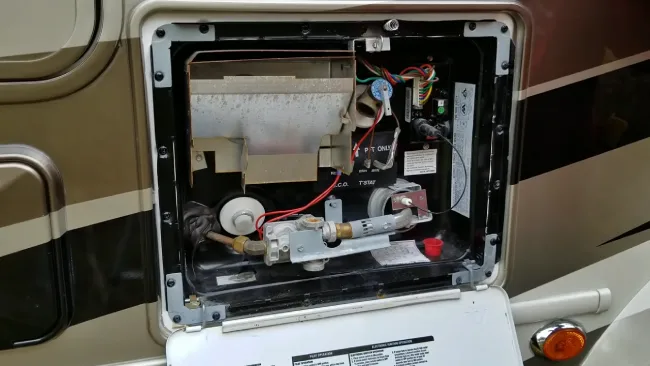
There are a few factors to consider when deciding whether to leave your RV water heater on or off.
#1: When the RV Is Not in Use
To save energy and prevent potential hazards, turn off the water heater when not using your RV or storing it for an extended period. Leaving it on can result in unnecessary energy waste and the possibility of malfunctions going unnoticed.
#2: When Refueling
Water heaters rely on propane fuel, which is flammable, making even a small spark dangerous when refueling. To minimize the risk of fire or explosion, it’s essential to avoid using other propane-powered appliances like stoves or ovens while refueling.
Also, park your RV in a well-ventilated area away from ignition sources like cigarettes or welding equipment.
#3: When Traveling
Turn off your hot water system to prevent damage and leaks during travel. Bumpy roads and movement can cause your water heater to bounce around and increase pressure, leading to leaks.
Turning it off will save energy, prolong the system’s life, and ensure a worry-free journey. Simply turn it back on at your destination and enjoy a hot shower.
#4: When Low on Water
When your RV’s freshwater supply is running low, it’s essential to conserve water to avoid damage to the water heater’s components. Using a water heater without sufficient water can lead to costly repairs.
To save water, try taking shorter showers or utilizing campground facilities. Another option is to invest in a portable water tank to have extra freshwater available. Remember that traveling with a full freshwater tank adds weight to your RV, reducing fuel efficiency and safety.
What Are the Pros and Cons of Leaving RV Water Heaters On?
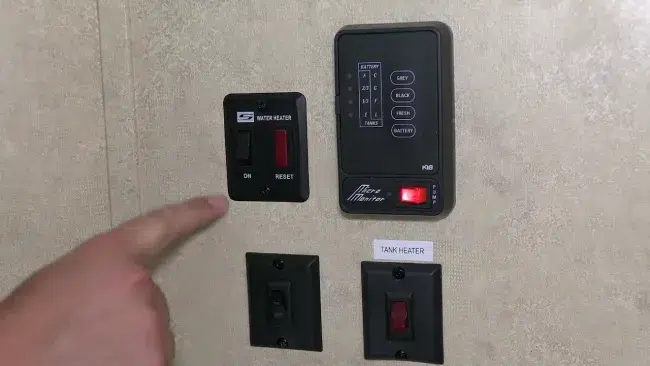
If you’re considering whether or not to leave your RV water heater on, there are some pros and cons to weigh before making a decision.
Let’s go ahead with the pros first:
- Convenience
Keeping the water heater on ensures that hot water is readily available whenever you need it. You don’t have to wait for the water to heat up before using it, which can be particularly beneficial when you’re on the go or have limited time.
- Comfort During Cold Weather
Leaving the water heater on can help maintain a comfortable living environment by providing consistently hot water for showers camping in colder climates. Having steaming water available can keep temperatures inside your RV comfortable in the winter months.
Let’s move on to the cons:
- Energy Consumption
Keeping the water heater constantly running can consume a significant amount of energy. This can be a concern if you’re camping off-grid or if you want to conserve energy to extend your battery life or reduce fuel consumption.
- Propane Usage
Most RV water heaters operate on propane. And leaving the water heater on means continuous propane consumption. This can deplete your propane supply more quickly, requiring more frequent refills or affecting the overall duration of your propane reserves.
- Risk of Accidents
Leaving the water heater on increases the risk of accidents, particularly if you’re not present in the RV or if there’s a malfunction. There is a possibility of leaks, overheating, or even fires if the water heater is left unattended for an extended period.
- Maintenance and Wear
Continuous operation can increase wear and tear on the water heater components, including the heating element and tank. This may necessitate more frequent maintenance or repairs over time. Plus, if the water heater is set to a higher temperature than necessary, you could be paying more in energy costs.
Can leaving the water heater on damage the RV’s plumbing system?
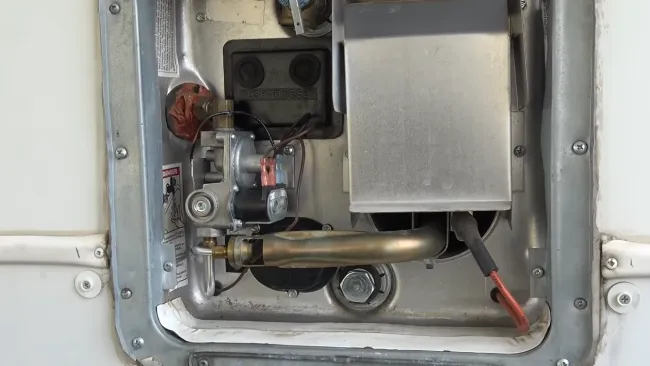
Leaving the RV water heater on can potentially worsen any existing plumbing issues, though immediate damage may not occur. Regular maintenance and inspections are important to ensure everything is in working order.
Even with well-maintained systems, leaving the water heater on for prolonged periods can increase wear and tear on valves and pipes. This can result in premature failure and costly repairs.
It’s generally safe to leave the water heater on during typical usage, but regular checks by a professional plumber are recommended.
Can leave the RV water heater turned on affect the lifespan of the heating element?
Leaving your RV water heater on all the time can potentially harm the lifespan of the heating element. Typically, the heating element in an RV water heater cycles automatically to maintain the desired water temperature. Keeping the heating element continuously on may cause it to degrade faster due to excessive wear and tear.
One of the major concerns when always leaving the water heater on is overheating. Elevated water temperatures can put additional stress on the heating element, causing it to deteriorate even more quickly.
Also, a continuous operation may result in deposits of mineral buildup inside the water heater, further decreasing its efficiency and potentially damaging the heating element.
Will leaving the water heater turned on draining my RV’s battery?
Leaving the water heater activated can drain your RV’s battery, especially when camping off-grid. The water heater uses continual energy to keep the water warm, leading to a battery drain.
It’s crucial to know your RV’s power needs and plan accordingly. Turn the water heater off when not in use to conserve energy and extend battery life. Propane is an alternative power source for the water heater that doesn’t rely on electricity.
Conserving energy helps extend camping time without running out of power unexpectedly.
Balancing Energy Conservation and Convenience in RV Water Heater Usage
Leaving your RV water heater on is generally safe, but it’s conditional on certain factors. Ensure maintain a stable power source, keep tabs on usage patterns, conduct frequent maintenance checks, and set an appropriate temperature.
While convenient, it has downsides like increased energy use, propane consumption, and potential safety hazards. When you’re not using it, refueling, on the move, or running low on water supply, it’s best to switch it off.
So, it’s crucial to balance convenience and energy conservation and carry out regular plumbing inspections to ensure proper functioning.

